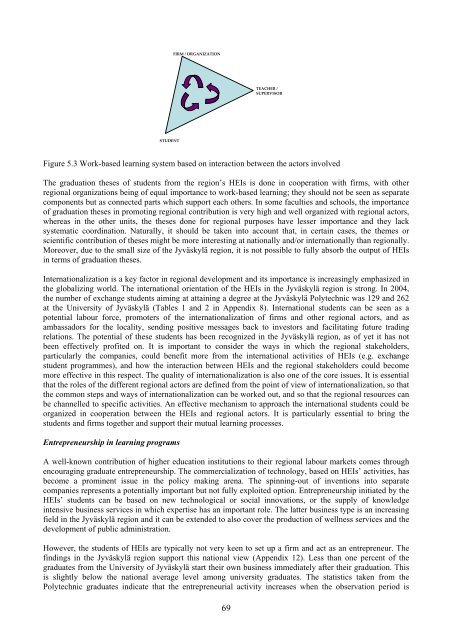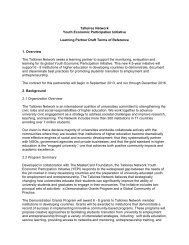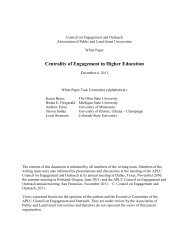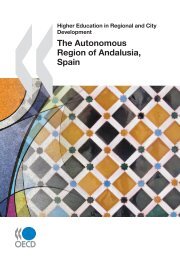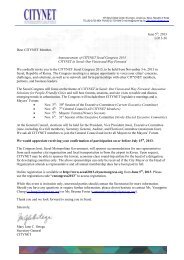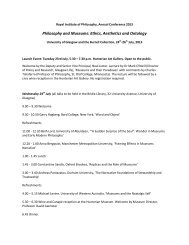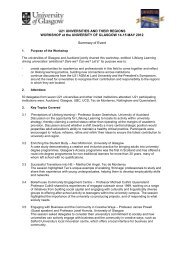FIRM / ORGANIZATIONTEACHER /SUPERVISORSTUDENTFigure 5.3 Work-based learning system based on interaction between the actors involvedThe graduation theses of students from the region’s HEIs is done in cooperation with firms, with otherregional organizations being of equal importance to work-based learning; they should not be seen as separatecomponents but as connected parts which support each others. In some faculties and schools, the importanceof graduation theses in promoting regional contribution is very high and well organized with regional actors,whereas in the other units, the theses done for regional purposes have lesser importance and they lacksystematic coordination. Naturally, it should be taken into account that, in certain cases, the themes orscientific contribution of theses might be more interesting at nationally and/or internationally than regionally.Moreover, due to the small size of the Jyväskylä region, it is not possible to fully absorb the output of HEIsin terms of graduation theses.Internationalization is a key factor in regional development and its importance is increasingly emphasized inthe globalizing world. The international orientation of the HEIs in the Jyväskylä region is strong. In 2004,the number of exchange students aiming at attaining a degree at the Jyväskylä Polytechnic was 129 and 262at the University of Jyväskylä (Tables 1 and 2 in Appendix 8). International students can be seen as apotential labour force, promoters of the internationalization of firms and other regional actors, and asambassadors for the locality, sending positive messages back to investors and facilitating future tradingrelations. The potential of these students has been recognized in the Jyväskylä region, as of yet it has notbeen effectively profited on. It is important to consider the ways in which the regional stakeholders,particularly the companies, could benefit more from the international activities of HEIs (e.g. exchangestudent programmes), and how the interaction between HEIs and the regional stakeholders could becomemore effective in this respect. The quality of internationalization is also one of the core issues. It is essentialthat the roles of the different regional actors are defined from the point of view of internationalization, so thatthe common steps and ways of internationalization can be worked out, and so that the regional resources canbe channelled to specific activities. An effective mechanism to approach the international students could beorganized in cooperation between the HEIs and regional actors. It is particularly essential to bring thestudents and firms together and support their mutual learning processes.Entrepreneurship in learning programsA well-known contribution of higher education institutions to their regional labour markets comes throughencouraging graduate entrepreneurship. The commercialization of technology, based on HEIs’ activities, hasbecome a prominent issue in the policy making arena. The spinning-out of inventions into separatecompanies represents a potentially important but not fully exploited option. Entrepreneurship initiated by theHEIs’ students can be based on new technological or social innovations, or the supply of knowledgeintensive business services in which expertise has an important role. The latter business type is an increasingfield in the Jyväskylä region and it can be extended to also cover the production of wellness services and thedevelopment of public administration.However, the students of HEIs are typically not very keen to set up a firm and act as an entrepreneur. Thefindings in the Jyväskylä region support this national view (Appendix 12). Less than one percent of thegraduates from the University of Jyväskylä start their own business immediately after their graduation. Thisis slightly below the national average level among university graduates. The statistics taken from thePolytechnic graduates indicate that the entrepreneurial activity increases when the observation period is69
longer. 2.5% of the Jyväskylä Polytechnic’s students graduating in 2000 were entrepreneurs three years later,whereas the share of students starting a business immediately after their graduation was one percent less. Theentrepreneurship of graduates from the Jyväskylä Polytechnic is almost at the national average level of allpolytechnics, as nearly 2% of graduates from 1999-2003 were entrepreneurs at the end of the year 2003.According to the representatives of the HEIs, the importance of spin-off -firms generated from students’ orresearchers’ initiatives is not notable in the Jyväskylä region and exact statistics on spin-off firms are notavailable.A recent Ministry of Education study (2005c) shows that there are no specific entrepreneurship strategies inFinnish universities, but it is considered to be an important strategic issue. Business know-how is an essentialpart of entrepreneurship regardless of the substance on which the entrepreneurship builds on. The aim is toincrease academics’ understanding of entrepreneurship and business life. In five universities in <strong>Finland</strong> it ispossible to study entrepreneurship as a major subject, the University of Jyväskylä being one of them. This isone way to promote entrepreneurship in universities. According to the study, the universities recognizedseveral future challenges concerning entrepreneurship. These challenges take place mainly in finance, theinteraction between universities and their interest groups, as well as in the ongoing curriculum reform. Onthe whole, entrepreneurship and its promotion mostly appear in Finnish universities either in the form ofteaching entrepreneurship or as social and regional influencing. The Finnish government has devised anentrepreneurship program and one part of it is to improve the capacity of universities and polytechnic topromote entrepreneurship.The School of Business and Economics at the University of Jyväskylä and the School of Business at theJyväskylä Polytechnic provide teaching in business studies that includes coverage for entrepreneurship.Additionally, the students from other fields can profit from this knowledge base in both institutions and, forexample, at the University the customized learning programmes that cover the basis of business thinking areorganized for students of other faculties. In the Polytechnic, the activation of students and the exploitation oftheir know-how in the R&D projects, also contribute to entrepreneurial thinking and increase the students’willingness to become entrepreneurs. The Jyväskylä Polytechnic defined internal entrepreneurship policyguidelines in the spring of 2005. As a part of that, a group of teachers is developing an operation model thataims to form an entrepreneurship path for each school (see Appendix 13).Box 5.1 Team Academy promotes entrepreneurshipThe Team Academy, founded in 1993, is a unit at the Jyväskylä Polytechnic specialized in marketing,management and entrepreneurship. The unit operates in Jyväskylä (217 students) and Jämsänkoski (163students). During the last ten years, the Team Academy has provided various forms of entrepreneurialeducation, serving the needs of the business world. Every student takes over three years of intensivetraining in leadership and marketing as a member of a team. Team Academy is a learning laboratory,where new learning methods and models for business life are continuously being developed (e.g.building effective teams, learning organizations and modern marketing). The establishing of one’s ownbusiness is not the only aim of the education, as an increasingly stronger focus is on mentalentrepreneurship. The aim is to increase the entrepreneurial spirit of those working in their owncompanies as well as of those employed by others.Entrepreneurial thinking has been promoted at the University of Jyväskylä and Jyväskylä Polytechnic but,due to the increasing importance of knowledge-based high-technology business, a low rate ofentrepreneurship, the age structure of existing entrepreneurs, and the resulting threat of the disappearance offirms in the Jyväskylä region, there is a clear need to continue and strengthen those efforts. An important aimof HEIs should be to create a favourable atmosphere for entrepreneurship and emphasize it as a relevantalternative to the wage work. These activities should be directed to all students regardless of their studyfields.In addition to the above mentioned factors, the regional intermediate organizations support thecommercialization of innovations and entrepreneurship. Jyväskylä Science Park promotes knowledgeintensive entrepreneurship through the Centre of Expertise Programme and incubator process for technologyenterprises. Their active role and visibility in connection with the HEIs could be further promoted.70
- Page 1 and 2:
OECD/IMHE ‐ Supporting thecontrib
- Page 3 and 4:
SUMMARYTogether with 13 other regio
- Page 5 and 6:
8.2 Increasing the regional effecti
- Page 7 and 8:
I INTRODUCTION1.1 Strengthening the
- Page 9 and 10:
development. The aim is that region
- Page 11 and 12:
The self-evaluation considered here
- Page 13 and 14:
densely populated cities in Finland
- Page 15 and 16:
1,9 %1,7 %1,5 %1,3 %Population chan
- Page 17 and 18:
The share of jobs in primary produc
- Page 19 and 20: New pillars of future’s developme
- Page 21 and 22: Jyväskylä0,60,91,11,0Central Finl
- Page 23 and 24: 2.4 Governance StructureMunicipalit
- Page 25 and 26: of its development outside the cent
- Page 27 and 28: III CHARACTERISTICS OF THE HIGHER E
- Page 29 and 30: continuing education and open unive
- Page 31 and 32: The Science and Technology Policy C
- Page 33 and 34: 3.2 Regional dimension within the n
- Page 35 and 36: order to respond to the challenges
- Page 37 and 38: 14001200Master's degreesDoctoratesN
- Page 39 and 40: 900800Youth graduatedAdult graduate
- Page 41 and 42: provide information for the basis o
- Page 43 and 44: CabinetParliamentSTPCSteering (andf
- Page 45 and 46: 5,04,0Billion euros3,02,01,00,083 8
- Page 47 and 48: The number of refereed articles is
- Page 49 and 50: Centre of expertisePaper industryBi
- Page 51 and 52: The Institute for Environmental Res
- Page 53 and 54: and systematic gradually progressin
- Page 55 and 56: are seen to be very important chann
- Page 57 and 58: Internal support units of HEIsThe F
- Page 59 and 60: of interviewed HEI staffs, the coop
- Page 61 and 62: areas of the region’s Centre of E
- Page 63 and 64: system of Jyväskylä and the HEIs
- Page 65 and 66: V CONTRIBUTION OF TEACHING AND LEAR
- Page 67 and 68: esources to establish new activitie
- Page 69: The main problem for the Finnish la
- Page 73 and 74: activities. As a part of the new qu
- Page 75 and 76: education programmes consisting of
- Page 77 and 78: the TE-Centre of Central Finland an
- Page 79 and 80: practices in the provision of educa
- Page 81 and 82: Reason forskillupgradingDescription
- Page 83 and 84: Strengths+ HEIs are actively confro
- Page 85 and 86: taxation, to lower the unemployment
- Page 87 and 88: Box 6.2 The WIRE -projects: Support
- Page 89 and 90: indoor ice-skating rink, the Rauhal
- Page 91 and 92: The School of Cultural Studies at t
- Page 93 and 94: the number of registered customers
- Page 95 and 96: Box 6.9 Environmental management in
- Page 97 and 98: Strengths+ The significance of HEIs
- Page 99 and 100: eferring to the regional developmen
- Page 101 and 102: Key topics relating to changes in t
- Page 103 and 104: participation in the decision makin
- Page 105 and 106: in the strategy-making process. The
- Page 107 and 108: 7.5 Critical points in promoting th
- Page 109 and 110: 7.Cooperation in strategies concern
- Page 111 and 112: egion is according to national and
- Page 113 and 114: oundaries for further developmental
- Page 115 and 116: joining resources and operations by
- Page 117 and 118: Discussion proposal 15: To ensure d
- Page 119 and 120: achieved by the horizontal utilizat
- Page 121 and 122:
Appendix 2 Information on data used
- Page 123 and 124:
and finding synergy between the oth
- Page 125 and 126:
School of BusinessRoleThe School of
- Page 127 and 128:
The challenge of the school from re
- Page 129 and 130:
developing wellness and environment
- Page 131 and 132:
Faculty of EducationRoleThe Faculty
- Page 133 and 134:
and/or graduation thesis is a signi
- Page 135 and 136:
Areas of strength and prioritising
- Page 137 and 138:
Agora Center’s partners from the
- Page 139 and 140:
Currently the priority of ITRI’s
- Page 141 and 142:
Weak spots and areas to develop in
- Page 143 and 144:
Employment and Economic Development
- Page 145 and 146:
Appendix 3 Analysis of the most sig
- Page 147 and 148:
Appendix 4 Regional effects (input-
- Page 149 and 150:
The overall value of production cre
- Page 151 and 152:
Appendix 5 Reform of regional struc
- Page 153 and 154:
Appendix 7 Provision of education i
- Page 155 and 156:
Appendix 8 Statistical information
- Page 157 and 158:
Appendix 10 Statistics on financing
- Page 159 and 160:
Appendix 12 Labour market activity
- Page 161 and 162:
Appendix 14 Master’s Programmes a
- Page 163 and 164:
Uusiutuvan energian tutkimusohjelma
- Page 165 and 166:
BIBLIOGRAPHYAcademy of Finland (200


